- Home
- Parnell Hall
7 Shot Page 2
7 Shot Read online
Page 2
And my beeper went off.
Damn.
The office was beeping me with another case. Ordinarily that would have been great. But I had Melissa Ford to take care of.
Here’s where you have to bear with me. I was gonna turn the case down. Honest.
I cruised around the Bronx, found a pay phone that hadn’t been gutted and called the office with every intention of turning the assignment down.
But Richard wasn’t there. He was in court. The only one there was Wendy or Janet, Richard’s two switchboard girls who happened to have identical voices, so you never knew who you were dealing with. And whichever it was, Wendy or Janet, she wasn’t about to listen. Richard hadn’t told her I was taking time off, Richard hadn’t told her I was turning down cases, if she was gonna let me do that, she was gonna have to hear it from Richard. Which, of course, couldn’t happen with him in court. And, Wendy/Janet pointed out, the case was in Harlem, I was just across the bridge in the South Bronx, and what was the big deal?
Now, I know all that’s no excuse, but it was easier to do it than argue, and the long and the short of it was I took the case. And, I must admit, it did occur to me, I knock this off real quick, put two hours on my pay sheet and wind up with a two-hundred-and-fifty-dollar day.
I hopped in the car, went over the Willis/Third Avenue Bridge, and drove to the address on Adam Clayton Powell.
It was another combat zone. The building I wanted was no worse than Joe Oliver’s, but certainly no better. There was a bunch of teenage kids hanging out in front, which boded ill—it was late September, and by rights, they should have been in school. Plus there was the usual number of disreputable types hanging out in front of the buildings and prowling the street.
None of this was enough to dissuade the fearless investigator. I parked my car in front of the building, set the code alarm, grabbed my briefcase, put my heart in my mouth and marched determinedly up to the door.
They gave way, but not like at Joe Oliver’s. Teenagers don’t fear the law the way that junkies do. They figure being underage gives them a certain immunity, and in a way they figure right. And they’re unpredictable on the one hand, and stupid on the other, like the teenaged girls who terrorized the Upper West Side for a while by sticking pins in white women. Or like the pack that attacked the Central Park jogger. Wilding, a new word, a new concept, what a great idea.
Anyway, they made me nervous, and I went inside watching my back and hotfooted it up the stairs looking for Apartment Four. None of the apartments had numbers, natch, but by counting I located the most likely door and knocked on it. After a few moments, it was opened by a young black woman, attractive and thirtysomething. She looked tense and anxious, but not surprised to see me, and I figured I’d hit paydirt.
“Raheem Webb live here?” I said. “I’m from the lawyer’s office.”
She nodded. “Yes, yes. Come in.”
She ushered me into a clean but modestly furnished living room. Actually, “modestly furnished” was a charitable assessment. The couch and chairs appeared to have been gathered off the street. I sat down on the couch, opened my briefcase.
“Shall I get Raheem?” she said.
“Why don’t we get the paperwork out of the way first?” I said. (Wendy/Janet had told me Raheem Webb was ten years old—in such cases, the less the client had to be involved the better.) “I take it you’re Raheem’s mother.”
“Yes. I’m sorry. I’m Sheila Webb.”
“I’m Mr. Hastings from the lawyer’s office. Let’s go over the background information, then we’ll get Raheem.”
I pulled out a fact sheet and, with her help, filled in Raheem’s name, address, birth date and Social Security number, then filled in Sheila Webb’s birth date, Social Security number and telephone number as mother.
“Does his father live with you?” I asked.
It was a question I used to find terribly rude. But it was actually one that saved embarrassment. When I started the job, I used to just ask the mother for the kid’s father. I soon found with poor people, in many cases I was dealing with single mothers, and by asking for details on the father I was getting half-remembered addresses and phone numbers and never-remembered birth dates and Social Security numbers for some long-since departed individual who obviously had nothing to do with the current family structure. Compared to that, the simple, direct question was painless. Particularly since I had perfected the rap that followed the negative response. When Sheila Webb said, “No,” I came in smoothly with, “Then you will be responsible for signing all of the forms in this case. You understand your son Raheem is actually the client, but since he is underage, you are filing suit in his behalf.”
She nodded. “I understand.”
“Fine,” I said. “Now, I’ll need to hear it from Raheem, but why don’t you give me the background of his accident?”
Her eyes shifted slightly and she said, “He fell.”
That was strange. She hadn’t been fazed at all by the father-live-with-you question. But the question about the accident bothered her.
Which bothered me. I’d had cases before where the parent had sued in the child’s behalf, and everything had not looked entirely kosher. Sometimes, what a parent claimed was a trip and fall could actually turn out to be child abuse.
In this case, I couldn’t see it. I couldn’t imagine this nice, intelligent woman sitting opposite me abusing her child. But it was always possible she had some boyfriend or other who thought it was macho to keep the kid in line.
It was none of my business, and there was nothing I could do about it, but I caught it and I didn’t like it.
“I see,” I said. “And where did he fall?”
“On the street. Outside. You’ll have to ask Raheem about it.”
“You weren’t there?”
“No.”
“When was this?”
“Yesterday.”
“What time?”
“Yesterday afternoon. About three-thirty. I was here. He came upstairs. Told me he fell down. His face was all bloody.”
“You take him to the hospital?”
“Yes.”
“What hospital?”
“Harlem Hospital.”
“Ambulance come for him?”
“No. Car service.”
“There were no police on the scene?”
“No.”
“Any witnesses?”
“I don’t think so. You’ll have to ask Raheem.”
“What were his injuries?”
“His forehead was cut.” She indicated with her linger. “From here to here.”
“Were there stitches?”
“Yes.”
“How many?”
“Forty-four.”
“Forty-four stitches?”
“Yes.”
“They keep him overnight in the hospital?”
“No. They sent him home.”
I nodded, but I wasn’t happy. Forty-four stitches was a hell of a result from a trip and fall. This was looking more and more like child abuse.
“All right,” I said. “I guess I’d better talk to Raheem.”
She nodded, got up and went through a door into the back of the apartment. After a few moments I could hear her talking, though I couldn’t make out the words. Then her voice was joined by another—high-pitched, whiny, reluctant. I envisioned the scene without seeing it—the kid lying in bed, the mother prodding him to get up, the kid protesting.
She was back moments later, looking somewhat apologetic. “He’ll be right here. He’s getting his pants on.”
“I understand. I got a kid of my own. I’m always waiting on him.”
Her smile looked somewhat forced. She was plainly nervous.
Or was she? I mean, come on. Maybe I was imagining it. Wasn’t it natural to be nervous with a stranger in your house and an unpredictable ten-year-old who was keeping him waiting? This is none of your business, just get the job done so you can concentrate on Melissa Ford.
There were footsteps and we both looked up.
Raheem Webb stood in the doorway. He was a skinny kid, who appeared to be in that awkward phase where his limbs were growing faster than he could learn to control them. He was maybe five foot six goin’ on seven feet. His skin was coal black and smooth. He had nice features, like his mom. What I could see of them, anyway. His head was wrapped round and round with white bandages. It covered his entire forehead and his left eye. The white gauze made a sharp contrast against the black skin, made the bandage seem even more extensive than it was.
I smiled. “Hi, Raheem. I’m Mr. Hastings, from the lawyer’s office.” I shifted over on the couch. “You look like you’ve had quite a fall. Come here. Tell me about it.”
He hesitated in the doorway.
“Raheem,” his mother said, impatiently. “Go sit with the man.”
He gave her a look, rolled his one visible eye, then shambled over and flopped down on the couch.
“Now,” I said, “what can you tell me about the accident?”
He shrugged his shoulders. “Fell down.”
“Where’d you fall down?”
He jerked his thumb. “Outside.”
Just like Joe Oliver.
Maybe.
“In the street?”
“Yeah.”
“The street or the sidewalk?”
A pause. “Sidewalk.”
“Where? Right out front here?”
“Yeah.”
“Why’d you fall down?”
He frowned. At least I think he frowned—I couldn’t see his forehead with the bandage. The corners of his mouth turned down. He gave me a one-eyed squint, but said nothing.
“Raheem,” his mother prompted, “answer the man.”
He shrugged again. “I jus’ fell.”
“Yeah, but did you trip on something? Slip in something? Was the sidewalk broken?”
“Yeah,” he said. “The sidewalk.”
“It was broken?”
“Yeah.”
“Yeah,” I said. “That’s what I thought. So the sidewalk was broken. Can you show me where that was?”
“Why?”
I reached in my briefcase and pulled out my camera. “I have to take pictures of it. For your case.”
“Oh.”
“So can you show me where it was?”
Shrug. “Guess so.”
His mother let out a breath in exasperation. “Raheem. The man wants you to go show him. Now get your shoes on.”
“Aw, mom.”
She pointed at the bedroom. “Raheem. Go.”
He got up and shuffled into the bedroom.
She looked at me. “Really,” she said. “He’s a good boy. Just lazy.”
Yeah, I thought. And mighty reluctant to show me the crack that tripped him.
Raheem came back with a pair of worn tennis sneakers. He flopped back down on the couch next to me and began pulling them on over his bare feet.
A high-pitched “beep, beep, beep” filled the room.
Damn. The office. Of all the luck. I was having a hard enough time dealing with Raheem Webb without being interrupted. And the last thing I needed was Wendy/Janet giving me yet another case I didn’t have time to handle.
I reached on my belt and pushed the button to shut my beeper off.
But nothing happened.
The damn thing kept beeping.
I’m a slow take, and I actually pushed the button again before I realized it wasn’t my beeper.
Before I saw the sick look on Sheila Webb’s face.
Before I saw Raheem Webb fumbling under his T-shirt and suddenly the noise stopped.
That’s when it hit me.
Shit.
Raheem Webb was wearing a beeper. And it seemed unlikely that ten-year-old Raheem Webb was a doctor or lawyer or private detective like me, a professional man who needed to wear a beeper for his job. No, the beeper meant he was one of those heartbreaking kids you read about in the Post—a crack runner, a mule, a kid carrying dope for a pusher.
I felt sick. But it was none of my business, and there was nothing I could do. Hell, even a cop couldn’t do anything. There was no law against wearing a beeper. Kids can walk right by cops with beepers hanging off their belts in plain view and the cops can’t do a damn thing about it. Not unless they catch ’em with the drugs. Which somehow they never seem to do. Well, they do, but not enough to matter. And when they do, so what, the kid’s a juvenile anyway. And the kids never rat on the pushers. Not if they want to stay healthy. Not if they want to stay alive.
I looked at Sheila Webb and I could see the pain and embarrassment in her face. So that was what she was edgy about. Not child abuse. This.
I wanted to do something to help her. But, as I said, there was nothing I could do. Anyway, hell, it wasn’t my problem, it wasn’t my fault. Jesus Christ, I shouldn’t have been there to begin with, I didn’t want the assignment, why the fuck did Richard have to pick this day over all others to be in court, damn it to hell, it just wasn’t fair.
Suddenly, I just wanted to get out of there. That was the quick and easy solution—be less painful for all of us. A typical Hastings decision—the coward’s way out.
I stuck my clipboard back in my briefcase, brought the interview to a close. I picked up my camera and snapped off a few shots of Raheem’s bandaged face, then took him downstairs to shoot the scene of his accident.
Having one eye didn’t slow him down any, or maybe he was just eager to get away from mom after the beeper bit, but when I said, “Let’s go,” he got up and scooted out the door. I grabbed my briefcase and followed him out, mumbling something at his poor mother. I still couldn’t quite catch up, and I was only halfway down the stairs when he went out the front door.
I’d just reached the bottom of the stairs when I heard a loud voice from outside, “Hey, nigger, I beep you, where the fuck you been?”
I went out the front door. Raheem was at the bottom of the front steps, standing with the group of kids I’d seen on my way in. Then, I’d just seen them as a potential threat. Now, I noticed two of them also were wearing beepers.
But it wasn’t any of them whose voice I’d heard. ’Cause they, like Raheem, were all looking out in the street. Naturally, I looked too.
Standing there was a large black man, about twenty-five years of age, muscular, a skin-head, with a moustache and goatee and scowl on his face that made my stomach jump through hoops.
He saw me at the same time I saw him. His eyes widened, then narrowed, then flicked to Raheem. The scowl that had been frightening before was murderous now.
“Motherfucker!” he growled.
Then he turned on his heel and walked away. Not slow, but not fast either. Head high, arrogant, insolent.
Jesus Christ.
Like I said, it was none of my business on the one hand, and there was nothing I could do on the other.
And I said nothing about the incident. I just walked over to a rather shaken looking Raheem and asked him to show me where he fell. After a few moments, he showed me a crack in the sidewalk and I duly shot a roll of film of it.
Raheem had no problem pointing out a crack in the sidewalk—the block was sure full of ’em. And it didn’t matter which crack he picked. He knew and I knew no crack in the sidewalk had ever tripped him.
After the scene I’d just witnessed, it didn’t take any genius to figure out where he’d got those forty-four stitches in his head.
4.
“HE’S AFTER HER MONEY,” Alice said.
I didn’t want to hear it. I was tired, frustrated and angry. It was later that night, and Alice and I had just finished a spirited argument about practicing birth control. Don’t get me wrong—we’re both for it. We have no religious, ethical or moral problems with birth control. Our son Tommie is all the children we can possibly afford to raise, and we have long ago come to the agreement that we are never going to have any more. So the argument, as always, was not over whether we s
hould practice birth control—we both agree we should. The argument was over whether we should practice it tonight.
I, as always, was in favor. Alice cast the dissenting vote. I think basically that’s the difference between the sexes. Alice, with the passing years, has become mature, calm, adult. I, on the other hand, seem to retain my adolescent instincts.
I suspect that this disparity between the sexes is one of the causes of mid-life crisis, one of the things that drives men my age to start running around chasing hopelessly younger women. Don’t get me wrong—I have no idea to go out chasing teenyboppers or whatever the hell they call them these days. No, basically, I’d just like to win the argument a little more often.
This night I’d lost, which was not surprising. It was that sort of day. What with the Raheem Webb case, which I could do nothing about, and the Melissa Ford case, which I hadn’t had time to work on, I was in a really foul mood. And having just lost the great birth control debate, it really riled me to hear Alice say that about my client Melissa Ford.
Because that was my view too. And it was, as I’ve said, a wholly sexist view, and one I chided myself for. And now here was Alice expressing it. And what was really frustrating as hell was, Alice is so good at arguments, I knew if I called her on it, told her what she’d expressed was a totally sexist opinion, she’d be able to talk her way out of it and prove that it wasn’t.
I just couldn’t help myself. I frowned. “Why do you say that?”
“Come on,” Alice said. “The way you describe the woman, why else would he be interested in her?”
“Maybe he likes her for her mind,” I said innocently.
Alice turned on me. “What an obnoxious, sexist thing to say.”
My mouth fell open. “What?”
“You heard me.”
“That’s not a sexist thing to say. Just the opposite.”
Alice shook her head. “No, no, no. Not the way you said it.”
“What’s wrong with how I said it?”

 Clicker Training
Clicker Training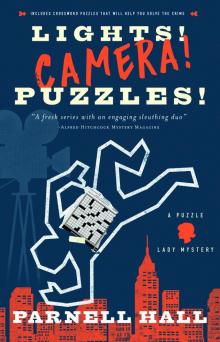 Lights! Camera! Puzzles!
Lights! Camera! Puzzles!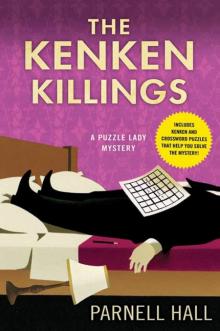 The KenKen Killings
The KenKen Killings 12-Scam
12-Scam The Puzzle Lady vs. the Sudoku Lady
The Puzzle Lady vs. the Sudoku Lady 2 Murder
2 Murder 7 Shot
7 Shot You Have the Right to Remain Puzzled
You Have the Right to Remain Puzzled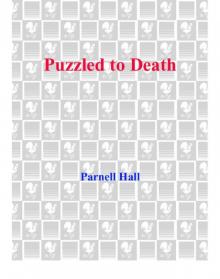 Puzzled to Death
Puzzled to Death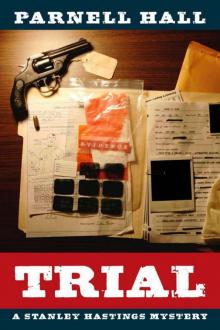 11-Trial
11-Trial The Witness Cat (Steve Winslow Mystery)
The Witness Cat (Steve Winslow Mystery) With This Puzzle, I Thee Kill
With This Puzzle, I Thee Kill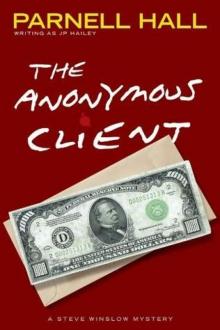 The Anonymous Client sw-2
The Anonymous Client sw-2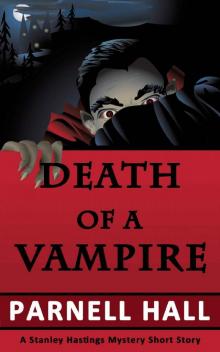 Death of a Vampire (Stanley Hastings Mystery, A Short Story)
Death of a Vampire (Stanley Hastings Mystery, A Short Story) The Wrong Gun sw-5
The Wrong Gun sw-5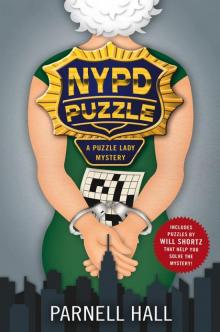 NYPD Puzzle
NYPD Puzzle 6 Juror
6 Juror 07-Shot
07-Shot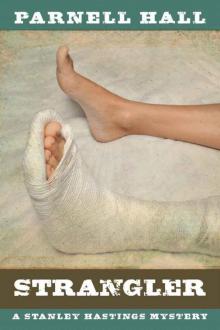 04-Strangler
04-Strangler 02-Murder
02-Murder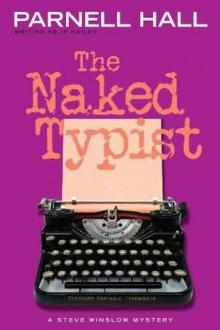 SW04 - The Naked Typist
SW04 - The Naked Typist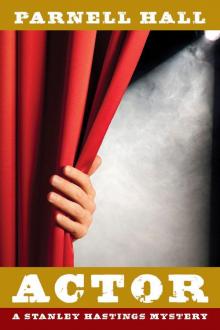 Actor
Actor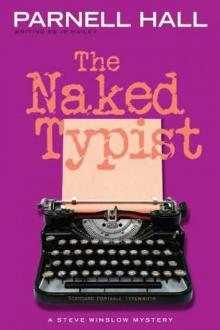 The Naked Typist sw-4
The Naked Typist sw-4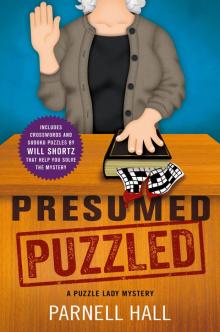 Presumed Puzzled
Presumed Puzzled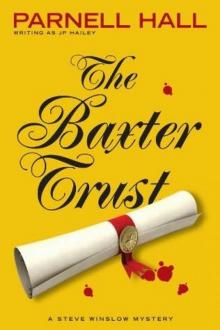 SW01 - The Baxter Trust
SW01 - The Baxter Trust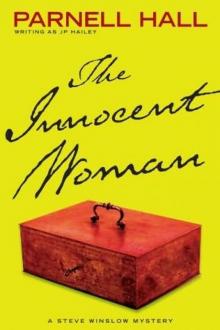 SW06 - The Innocent Woman
SW06 - The Innocent Woman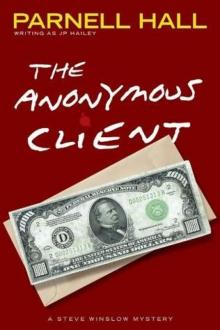 SW02 - The Anonymous Client
SW02 - The Anonymous Client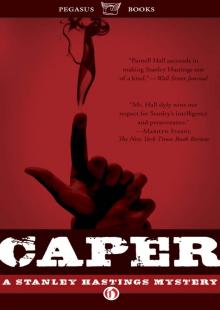 Caper
Caper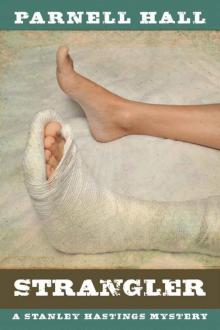 4 Strangler
4 Strangler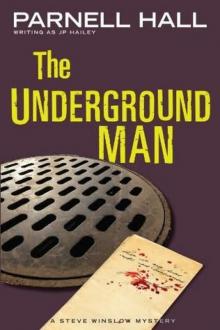 The Underground Man sw-3
The Underground Man sw-3 Manslaughter (Stanley Hastings Mystery, #15)
Manslaughter (Stanley Hastings Mystery, #15)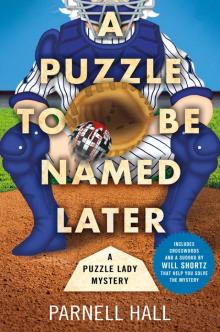 A Puzzle to Be Named Later--A Puzzle Lady Mystery
A Puzzle to Be Named Later--A Puzzle Lady Mystery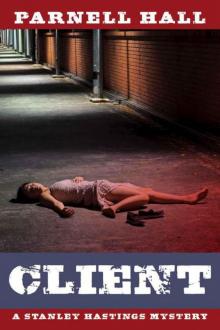 05-Client
05-Client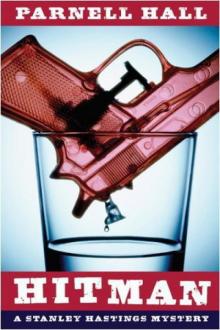 16 Hitman
16 Hitman SW05 - The Wrong Gun
SW05 - The Wrong Gun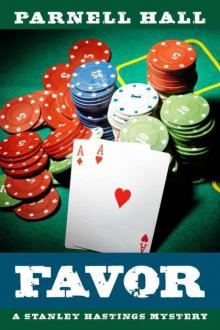 3 Favor
3 Favor Last Puzzle & Testament
Last Puzzle & Testament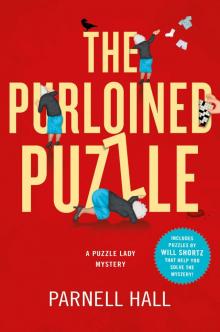 The Purloined Puzzle
The Purloined Puzzle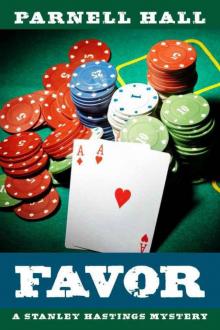 03-Favor
03-Favor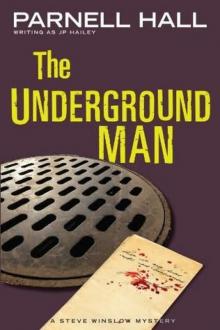 SW03 -The Underground Man
SW03 -The Underground Man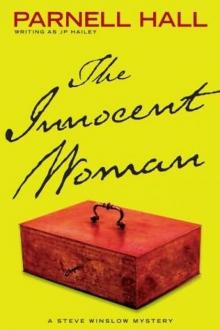 The Innocent Woman sw-6
The Innocent Woman sw-6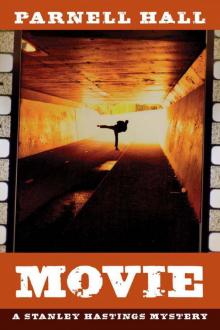 10 Movie
10 Movie 06-Juror
06-Juror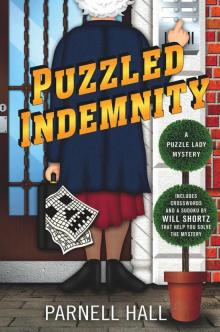 Puzzled Indemnity
Puzzled Indemnity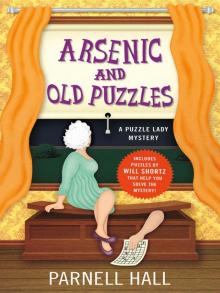 Arsenic and Old Puzzles
Arsenic and Old Puzzles Dead Man's Puzzle
Dead Man's Puzzle Safari
Safari $10,000 in Small, Unmarked Puzzles
$10,000 in Small, Unmarked Puzzles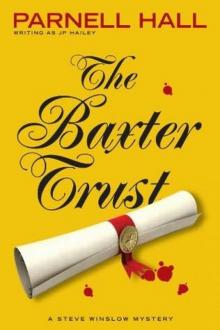 The Baxter Trust sw-1
The Baxter Trust sw-1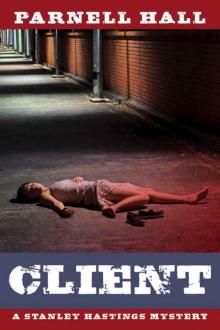 5 Client
5 Client Cozy (Stanley Hastings Mystery, #14)
Cozy (Stanley Hastings Mystery, #14)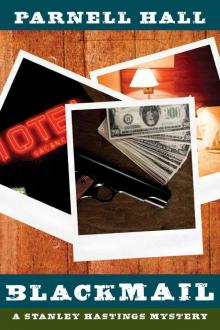 Blackmail
Blackmail A Puzzle in a Pear Tree
A Puzzle in a Pear Tree A Clue for the Puzzle Lady
A Clue for the Puzzle Lady Clicker Training (Stanley Hastings Mystery, A Short Story)
Clicker Training (Stanley Hastings Mystery, A Short Story)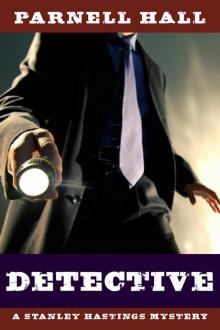 Detective (Stanley Hastings Mystery Book 1)
Detective (Stanley Hastings Mystery Book 1) 13 Suspense
13 Suspense